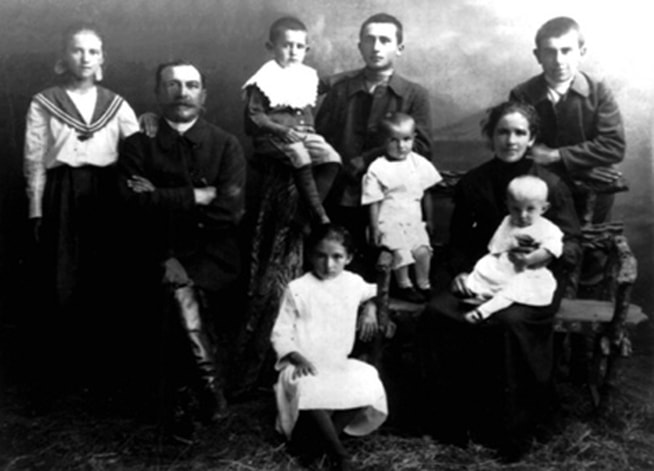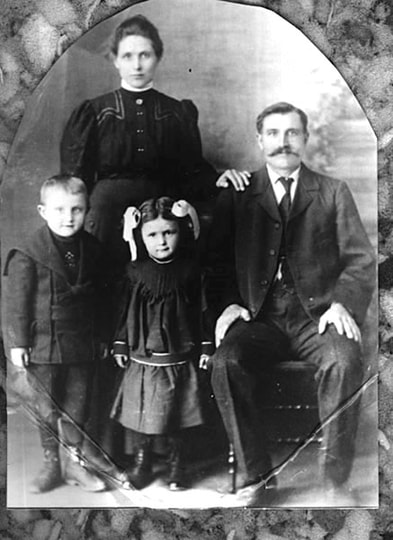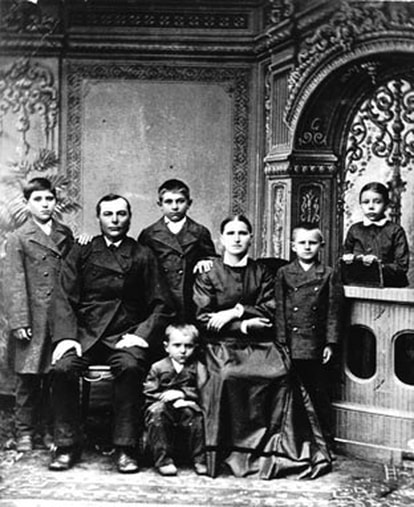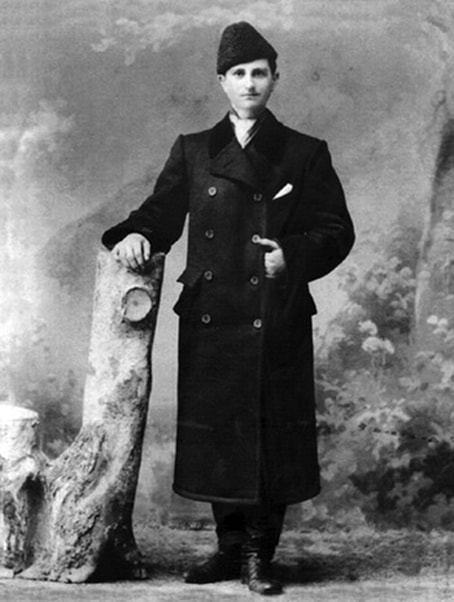People > Notable Norkans > Alexander Schreiber
Biography of My Father, Alexander Schreiber
By Marie Schreiber Baker
Alexander Schreiber - Sascha. My father as I remember him and what my mother told me about him.
I was five years old when my father died at age 32 of a ruptured appendix. He was also suffering with tuberculosis, a highly contagious disease and incurable in the 19th and early 20th centuries. My father's youngest brother, Conrad, died of tuberculosis at age 20 while attending college.
I was five years old when my father died at age 32 of a ruptured appendix. He was also suffering with tuberculosis, a highly contagious disease and incurable in the 19th and early 20th centuries. My father's youngest brother, Conrad, died of tuberculosis at age 20 while attending college.
My father was a kind, affectionate man. He adored his children. I have fond, vivid memories of him sitting on his lap, listening to stories (fairy tales) he told me.
My father was a proud, handsome, intelligent man. He came from a well to do family of business people.
My grandfather, Conrad Schreiber, together with his four sons owned and operated a large flour mill which was located in the Russian village of Dmitriyevka near the German village of Norka, where both of my parents were born and raised and where they had their religious roots. They were life members of the big Reformed Church in Norka, and whenever possible, the Schreiber family, traveled there to worship, always for special occasions such as partaking of the Lord's Supper, infant baptisms, confirmations, etc. Norka was the one of largest German villages on the Volga River. The Schreiber family often traveled to the Russian city of Saratov, where they did their shopping and attended the theater.
My father was a proud, handsome, intelligent man. He came from a well to do family of business people.
My grandfather, Conrad Schreiber, together with his four sons owned and operated a large flour mill which was located in the Russian village of Dmitriyevka near the German village of Norka, where both of my parents were born and raised and where they had their religious roots. They were life members of the big Reformed Church in Norka, and whenever possible, the Schreiber family, traveled there to worship, always for special occasions such as partaking of the Lord's Supper, infant baptisms, confirmations, etc. Norka was the one of largest German villages on the Volga River. The Schreiber family often traveled to the Russian city of Saratov, where they did their shopping and attended the theater.
My father had four brothers: Wilhelm, Lawrence, John and Conrad. Uncle Wilhelm was an officer in the Russian Army - a career man. He and his family did not live in the Schreiber family "compound," they lived elsewhere. My father had four younger sisters: Amelia, Natalie, Katherine and Amalia or Molly. Molly was a half sister. She was from Grandfather Schreiber's second marriage. My father's mother, Christina, died when the three older girls were quite young, all under ten years of age. After Grandpa Schreiber's second wife died, and before his own death, he requested of the boys to each take a sister into their homes and family, which they all did when the girls were all in their teens. Aunt Katherine (Katja) came to live with us, Aunt Amelia with Uncle Lawrence, Aunt Natalie with Uncle John, and Aunt Molly with Uncle Wilhelm.

This is a family photograph of Conrad and Christina Schreiber's son Wilhelm Conrad taken in 1919. From left to right upper row are: Olinde, Wilhelm (father), Waldemar, Alexander, Johannes. Lower row from left to right: Maria, Berta, Catharina (mother), and Fredrich on Catharina's lap. Courtesy of Andre Seifert, Germany.
After Grandfather Schreiber's death, the flour mill was sold and the estate divided among the four sons. With his inheritance, my father bought a ranch - a "model ranch": acres of land with a new house and barn, completely stocked with riding horses, cows and other farm animals. We had been living on this place less than a year when a fire broke out in the middle of the night. Presumably it started in the barn where all the horses and cows were sheltered. The barn, the house and all the animals were destroyed by the fire. We, the family, crawled out of the windows in our night clothes.
The fire which started in the barn was believed to have been arson by a Russian hired hand whom my father had fired the day before because of dishonesty. It was later learned that he was a member of the Bolshevik Party. Even at that time in 1906, the Bolsheviks were operating secretly. Their objective was to destroy the "prosperous Germans" by taking away - stealing. Ironically, they got away with these unlawful criminal activities.
Naturally, my parents were devastated by this tragedy having lost everything with no such thing as insurance in those days. I imagine the land was sold and the money used to reestablish themselves. Shortly after the fire, my parents decided to go to America where opportunities were better for anew start in life. They were still young, in their late twenties. So, that spring of 1907, Alexander and Anna Marie Schreiber, with their four small children, Natalie (six), Johannes (four), Maria - myself (two), and Wilhelm (eighteen months), started out for America. My father's two sisters, Natalie (eighteen) and Katherine - Katja (sixteen), traveled to America with us.
We arrived at Ellis Island on April 22, 1907, the day before my third birthday. Upon arriving at Ellis Island, three of the children came down with the measles: Natalie, Johannes and Wilhelm. They were taken to a large Catholic hospital in New York City. Johannes soon recovered. Natalie and Wilhelm were critically ill with complications of the disease and both died. Another heartbreak for my young parents!
Grief stricken, with little money left, plus the language barrier, we traveled on to our destination of Lincoln, Nebraska, where my mother's uncle, John Sauer and wife, Maggie, waited for us. Uncle John Sauer was our sponsor.
Uncle John and Aunt Maggie had no children of their own. They were kind, compassionate, generous folks. They helped my mother and father in every way they could to ease their pain, sorrow and burden by providing food and shelter until my father found a job. We lived rent free in one of Uncle John's houses all the while we were in Lincoln, about one year, before moving to Michigan near Saginaw to join Uncle Lawrence and family where there was work in the beet fields and the pay was better than the jobs they had in Lincoln. Also, common labor was something my father and Uncle Lawrence had never done before. In Russia, they were the aristocrats and had servants. Here in America with little or no knowledge of the English language and no special skills, they had no alternative.
Working in the beet fields one season was a means of making enough money for my parents return trip to Russia. Both of my parents were very homesick and disillusioned with America, especially my father.
Uncle Lawrence and family remained in Michigan. Later they moved to Detroit where Uncle Lawrence went to work for Henry Ford. He stayed on there until he retired.
My brother, Bill, was born while we were in Michigan on June 18, 1908. In December, after the beet harvest, we went back to Russia.
Only a few weeks after our arrival in Russia while staying at Uncle Wilhelm's place, my father became critically ill and died. His funeral and burial were in Norka.
Needless to say, my father's death was a traumatic experience for me, a shy, very sensitive five year old girl. I adored my father, no one could take his place in my life. All through my childhood and even as an adult, when things went badly for me I would say to myself, "If my father had lived everything would have been different - a happier childhood, a happier life." I cried easily. I cried a lot as a young girl. My mother knew and understood my problem. She shared my feelings for she too missed my father very much.
My mother and father's marriage was a "love match", not an arranged marriage as was the custom in their society and most of Europe at that time. Couples were matched with similar backgrounds, financially and socially. Alexander Schreiber and Anna Marie Sauer both came from prominent, well-to-do families. They were married in January, 1900, in the large Reformed Church in Norka. They had five children: Natalie, Johannes, Marija, Wilhelm No. 1 and Wilhelm No. 2.
My father was born December 2, 1876. He died in February, 1909.
My two aunts, Natalie and Katherine, who traveled to America with my family, stayed in Lincoln only a short time before going to Portland, Oregon, where we had relatives, cousins. There Aunt Natalie was reunited with Jacob Barthloma and they married. Jacob and Natalie were sweethearts in Russia. Aunt Katherine met a Russian man in Portland and married him. They returned to Russia shortly after their marriage to live there, a sad mistake - one my Aunt regretted the rest of her life.
My father's oldest sister, Amelia, came to America with Uncle Lawrence and family and settled in Michigan, the Detroit area. She never married - a career woman, worked in real estate. Aunt Molly emigrated to Portland in 1913. She married Henry Freauff.
Uncle John remained in Russia (Tanya's father). After Uncle Wilhelm's death, 1942?, his widow and children were shipped to Siberia to work in the slave labor camps there and where, years later, his grandchildren were educated by the Soviet Government and indoctrinated to Communism. So most of the younger generation are college educated professional people: doctors and engineers. They are paid monthly or yearly salaries and live in government housing apartments.
Some of my Schreiber relatives in Siberia live near the city, Novosibirsk, where the winters are long and bitter cold, while some live in the Alma Alta area, a climate comparable to California - warm and sunny. There is a large population of Germans in Siberia, those whose survived the labor camps, all banded together in certain communities.
My brother John and cousin Tanya corresponded with our Siberian cousins over a period of years, John in German and Tanya in Russian, until the last one died in 1976. There has been no contact since that time with the younger generation who are presumably actively involved in the Communist government, much to the sorrow and regret of their parents who clung to their faith in God to the end. It was their unwavering faith that sustained them through the incredible hardship and suffering.
In Siberia there are no churches. Public worship was forbidden. However these persecuted and brave people found a way to worship their God. They met secretly for prayer meetings and hymn singing in each other's modest, little homes which they built with their own hands. Mr. Leonhardt of Siberia told all this to me during his visit to Portland in 1973. He knew most of my relatives living there in Siberia and had personal contact with them. Mr. Leonhardt was a schoolmaster in Norka and also served as the church organist up until the time he was deported to Siberian labor camps along with thousands of others (1941?).
The German Russian people are a religious people. God takes top priority in their lives. Our ancestors were firmly grounded in their faith in God. How fortunate we are to be blessed with such a rich Christian heritage. I hope and pray that my children, grandchildren - all my descendants, too will value their religious background as much as I do.
The Schreiber family was noted for their warm friendly hospitality. They liked to entertain. The samovar was always steaming, ready for a hot cup of coffee, tea and snacks. A social time for whoever came by - friends, relatives and business associates.
The family home of the Schreiber compound was a big two story house with many rooms. Each couple with their children had their own private quarters: a bedroom-sitting room combination. They all shared the rest of the house and had their meals together. The hired help did the cooking and household chores while the young granddaughter-in-laws were free to look after their children's needs; in their leisure time they sewed, did fancy work, read and wrote letters. The men folks, Grandfather Schreiber, my father and his brothers, were busy running the flour mill business, a family cooperative.
My father, his brothers and my grandfather were great huntsmen. They went hunting for wild game and wild animals as well. They had trained hunting dogs and riding horses.
My father's grandmother, Elizabeth Schreiber - the matriarch, was highly respected by everyone. A powerful personality, she ruled the entire family living in the Schreiber compound, particularly the grandsons' young wives. They all feared her somewhat. Elizabeth was in control up until her death at age 91. She outlived her son Conrad and his two wives.
Great-grandmother Schreiber was very proud of the fact that her son and grandsons all married German women and not Russian women.
The family lived in a Russian community and the children attended Russian schools. Russian was spoken most of the time, but Great-grandmother Schreiber insisted that German be spoken in the home, and so it was. Both my father and mother had German schooling, both could read and write German.
The fire which started in the barn was believed to have been arson by a Russian hired hand whom my father had fired the day before because of dishonesty. It was later learned that he was a member of the Bolshevik Party. Even at that time in 1906, the Bolsheviks were operating secretly. Their objective was to destroy the "prosperous Germans" by taking away - stealing. Ironically, they got away with these unlawful criminal activities.
Naturally, my parents were devastated by this tragedy having lost everything with no such thing as insurance in those days. I imagine the land was sold and the money used to reestablish themselves. Shortly after the fire, my parents decided to go to America where opportunities were better for anew start in life. They were still young, in their late twenties. So, that spring of 1907, Alexander and Anna Marie Schreiber, with their four small children, Natalie (six), Johannes (four), Maria - myself (two), and Wilhelm (eighteen months), started out for America. My father's two sisters, Natalie (eighteen) and Katherine - Katja (sixteen), traveled to America with us.
We arrived at Ellis Island on April 22, 1907, the day before my third birthday. Upon arriving at Ellis Island, three of the children came down with the measles: Natalie, Johannes and Wilhelm. They were taken to a large Catholic hospital in New York City. Johannes soon recovered. Natalie and Wilhelm were critically ill with complications of the disease and both died. Another heartbreak for my young parents!
Grief stricken, with little money left, plus the language barrier, we traveled on to our destination of Lincoln, Nebraska, where my mother's uncle, John Sauer and wife, Maggie, waited for us. Uncle John Sauer was our sponsor.
Uncle John and Aunt Maggie had no children of their own. They were kind, compassionate, generous folks. They helped my mother and father in every way they could to ease their pain, sorrow and burden by providing food and shelter until my father found a job. We lived rent free in one of Uncle John's houses all the while we were in Lincoln, about one year, before moving to Michigan near Saginaw to join Uncle Lawrence and family where there was work in the beet fields and the pay was better than the jobs they had in Lincoln. Also, common labor was something my father and Uncle Lawrence had never done before. In Russia, they were the aristocrats and had servants. Here in America with little or no knowledge of the English language and no special skills, they had no alternative.
Working in the beet fields one season was a means of making enough money for my parents return trip to Russia. Both of my parents were very homesick and disillusioned with America, especially my father.
Uncle Lawrence and family remained in Michigan. Later they moved to Detroit where Uncle Lawrence went to work for Henry Ford. He stayed on there until he retired.
My brother, Bill, was born while we were in Michigan on June 18, 1908. In December, after the beet harvest, we went back to Russia.
Only a few weeks after our arrival in Russia while staying at Uncle Wilhelm's place, my father became critically ill and died. His funeral and burial were in Norka.
Needless to say, my father's death was a traumatic experience for me, a shy, very sensitive five year old girl. I adored my father, no one could take his place in my life. All through my childhood and even as an adult, when things went badly for me I would say to myself, "If my father had lived everything would have been different - a happier childhood, a happier life." I cried easily. I cried a lot as a young girl. My mother knew and understood my problem. She shared my feelings for she too missed my father very much.
My mother and father's marriage was a "love match", not an arranged marriage as was the custom in their society and most of Europe at that time. Couples were matched with similar backgrounds, financially and socially. Alexander Schreiber and Anna Marie Sauer both came from prominent, well-to-do families. They were married in January, 1900, in the large Reformed Church in Norka. They had five children: Natalie, Johannes, Marija, Wilhelm No. 1 and Wilhelm No. 2.
My father was born December 2, 1876. He died in February, 1909.
My two aunts, Natalie and Katherine, who traveled to America with my family, stayed in Lincoln only a short time before going to Portland, Oregon, where we had relatives, cousins. There Aunt Natalie was reunited with Jacob Barthloma and they married. Jacob and Natalie were sweethearts in Russia. Aunt Katherine met a Russian man in Portland and married him. They returned to Russia shortly after their marriage to live there, a sad mistake - one my Aunt regretted the rest of her life.
My father's oldest sister, Amelia, came to America with Uncle Lawrence and family and settled in Michigan, the Detroit area. She never married - a career woman, worked in real estate. Aunt Molly emigrated to Portland in 1913. She married Henry Freauff.
Uncle John remained in Russia (Tanya's father). After Uncle Wilhelm's death, 1942?, his widow and children were shipped to Siberia to work in the slave labor camps there and where, years later, his grandchildren were educated by the Soviet Government and indoctrinated to Communism. So most of the younger generation are college educated professional people: doctors and engineers. They are paid monthly or yearly salaries and live in government housing apartments.
Some of my Schreiber relatives in Siberia live near the city, Novosibirsk, where the winters are long and bitter cold, while some live in the Alma Alta area, a climate comparable to California - warm and sunny. There is a large population of Germans in Siberia, those whose survived the labor camps, all banded together in certain communities.
My brother John and cousin Tanya corresponded with our Siberian cousins over a period of years, John in German and Tanya in Russian, until the last one died in 1976. There has been no contact since that time with the younger generation who are presumably actively involved in the Communist government, much to the sorrow and regret of their parents who clung to their faith in God to the end. It was their unwavering faith that sustained them through the incredible hardship and suffering.
In Siberia there are no churches. Public worship was forbidden. However these persecuted and brave people found a way to worship their God. They met secretly for prayer meetings and hymn singing in each other's modest, little homes which they built with their own hands. Mr. Leonhardt of Siberia told all this to me during his visit to Portland in 1973. He knew most of my relatives living there in Siberia and had personal contact with them. Mr. Leonhardt was a schoolmaster in Norka and also served as the church organist up until the time he was deported to Siberian labor camps along with thousands of others (1941?).
The German Russian people are a religious people. God takes top priority in their lives. Our ancestors were firmly grounded in their faith in God. How fortunate we are to be blessed with such a rich Christian heritage. I hope and pray that my children, grandchildren - all my descendants, too will value their religious background as much as I do.
The Schreiber family was noted for their warm friendly hospitality. They liked to entertain. The samovar was always steaming, ready for a hot cup of coffee, tea and snacks. A social time for whoever came by - friends, relatives and business associates.
The family home of the Schreiber compound was a big two story house with many rooms. Each couple with their children had their own private quarters: a bedroom-sitting room combination. They all shared the rest of the house and had their meals together. The hired help did the cooking and household chores while the young granddaughter-in-laws were free to look after their children's needs; in their leisure time they sewed, did fancy work, read and wrote letters. The men folks, Grandfather Schreiber, my father and his brothers, were busy running the flour mill business, a family cooperative.
My father, his brothers and my grandfather were great huntsmen. They went hunting for wild game and wild animals as well. They had trained hunting dogs and riding horses.
My father's grandmother, Elizabeth Schreiber - the matriarch, was highly respected by everyone. A powerful personality, she ruled the entire family living in the Schreiber compound, particularly the grandsons' young wives. They all feared her somewhat. Elizabeth was in control up until her death at age 91. She outlived her son Conrad and his two wives.
Great-grandmother Schreiber was very proud of the fact that her son and grandsons all married German women and not Russian women.
The family lived in a Russian community and the children attended Russian schools. Russian was spoken most of the time, but Great-grandmother Schreiber insisted that German be spoken in the home, and so it was. Both my father and mother had German schooling, both could read and write German.
Source
Written by and used with the permission of Marie Baker (née Schreiber).
Last updated November 4, 2021.


